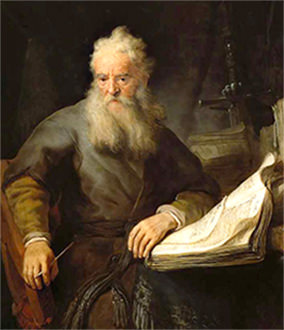Second Corinthians 3:3, 7–18 . . .
New Covenant Glory
After appreciating last week’s study, highlighting how believers “are to God the pleasing aroma of Christ” (2:15) and “are a letter from Christ” (3:3) we come to an historical background passage explaining better how hope and freedom come into our lives, thanks to the living Spirit of the Lord. Before we delve into each verse’s context and meaning, here’s a short CliffsNotes-type summary.
Having just begun to justify his ministry as an apostle of Jesus Christ, Paul reminds the Corinthians that he really needs no letter of accreditation, for those believers are his “epistles of commendation.” Through his ministry, which he’d written upon their hearts with the Spirit of the living God, they themselves have become an epistle of Christ (3:1–3). This he says with full realization that it’s God who’s made him sufficient as a minister of the new covenant, which is a ministry of the Spirit who gives believers life (3:4–6).
Paul then proceeds to contrast the new covenant with the old covenant, to illustrate the glorious nature of his ministry. With Exodus 34:29–35 as his reference, he equates the glory of the old covenant with the glory on Moses’ face, which was temporary. But if the old covenant — described as one of death and condemnation — had glory, how much more glorious is the new covenant, a ministry of the Spirit and of righteousness, which doesn’t pass away (3:7–11)! He says that there’s a kind of glory about the old covenant — having an attractiveness about it — symbolized here by the brightness of Moses’ face when he came down from the mountaintop with the tables of the Law. God, not Moses, made his face to shine by using grace, not grease.
Following his old-to-new comparisons, Paul says that those who listen only to the Old Testament still have a veil on their hearts (3:12–15). But when we turn to the Lord — the Spirit — the veil is taken away and there’s liberty. Also, by beholding the glory of the Lord with unveiled face, the Spirit of the Lord transforms us into the same glorious image of Christ (3:16–18).
Taking another look at v. 3:3 (shown at the bottom of the page), which is a relevant lead-in to today’s study, every believer should see himself or herself as a minister! Our ministry efforts are to show that we’re “a letter from Christ” — a written testimony — “written not with ink but with the Spirit of the living God, not on tablets of stone but on tablets of human hearts.” Paul wanted all ministers — the Corinthians and every one of us — to understand that the changes that occur in our lives, i.e., the freedom and deliverance from the evil habits we experience, all happen because Christ has changed us.
The New Covenant’s Greater Glory (vv. 7–11)
Now, to the greater glory of the new covenant The old covenant Law (the demand of God in the Ten Commandments, with its perfectly right and just demands) nevertheless always hits us at that point of our rebellion. We don’t like to be told what we must and mustn’t do. But the new covenant is different because God has found a way into our hearts, showing us his love and willingness to die on our behalf, and his ability to forgive us and set us free from past guilt. In vv. 7–8, Paul tells us that there’s a kind of glory — an attractiveness — about the old covenant, there symbolized by the brightness of Moses’ face when he came down from the mountaintop with the tables of the Law. But God made that brightness fade, because he wanted to teach something by that. It was a fading glory, a symbol of something that every one of us has experienced, one time or another.
Paul talks next about believers feeling the attractiveness of being glorified; after a while it becomes dull, boring, and routine, with death setting in. He calls that “the ministry of death,” a fading glory that doesn’t last. But when you discover the new principle of God-dependence, there’s an excitement — a glory — that’s greater than the one you feel when you want to show off what you can do. We should call this “the ministry of the Holy Spirit.” Thus, it won’t be you but it’ll be God who’ll accomplish things.
See how Paul starts v. 9. Everybody who tries to live a life that’s pleasing to God by self-effort always discovers that he or she never quite makes it, because one never knows when one has done enough. Some call that “the ministry of condemnation,” which results in trying to do something using only your own resources, by your own efforts. But Paul completes v. 9 with this revelation. Righteousness (a.k.a. worth) means: “being fully accepted”; “having a sense of being approved by God”; “of being honored and cherished by him.” God gives you a standing of worth that you don’t have to earn; you start with it and live with a sense of approval and security.
Again Paul makes a contrast. In v. 10, he talks about himself, looking back to the days when he counted on his background, skill, sharp mind, and dedicated heart for success. He says, in effect, I, Paul, have come to understand that God, who’s at work in me, can do so much more than I could ever do. We’re all called to be ministers of the new covenant. Only the Spirit of God enables us to minister; we can’t minister using our own efforts. If you understand that, your life will never be the same again.
Moses’ Old Covenant Veil (vv. 12–18)
It’s obvious in this next passage that the apostle is dealing with Moses’ veil as a symbol of the old covenant (shown here), that is, the Law, the Ten Commandments, with their demand upon us for a certain standard of behavior. When Moses came down from the mountaintop, his face was shining; that brilliant face of his becomes the symbol of the attractive glory about trying to keep the Law of God. But it was a fading glory, Paul tells us. He himself found something more exciting: the “new covenant,” a new way of living, provided by Father God in his Son, Jesus Christ. It’s the excitement of expecting God to work with and through us so that when we do ordinary things, God will be at work and great things will happen as a result.
Moses didn’t put a veil over his face because he was bold or confident. However, Paul contrasts his own boldness with that of Moses. What Moses did was born out of fear, compromise, an attempt to hide something that should have been seen. Paul confirms this by linking the action of Israel with their unbelief when he says this next (vv. 14–16). Such blindness is never removed, because it says here, “whenever anyone turns to the Lord, the veil is taken away.” You cannot take it off any other way; you have to turn to the Lord.
There’s one great area of hope found in the next two verses. The apostle reminds the Corinthians immediately that, though the veil is over their minds, the Lord is in their hearts, within their human spirits. Their hope of freedom comes from that great fact, for the one who is within them is God himself. Paul identifies him in v. 17: “Now the Lord is the Spirit, and where the Spirit of the Lord is, there is freedom.”
Note: 2nd Corinthians encourages believers to embrace and follow the way of Jesus that transforms lives and values generosity, humility, and weakness. In chapters 1–3, Paul presents these three elements:
Praising God (ch. 1) | Forgiving the offender (ch. 2) | The new covenant’s glory (ch. 3)
› Watch BibleProject’s superb animated video (2 min.) that highlights Paul’s messages in these three chapters.
† The Three Main Points of 2 Corinthians 3:3, 7–18
1) The superiority of the new covenant: Paul contrasts the old covenant, written on stone tablets, with the new covenant, written on human hearts by the Spirit of the living God. He emphasizes that the new covenant, ministered by the Spirit, brings life and righteousness, surpassing the glory of the old covenant.
2) The transformative power of beholding Christ's glory: Paul explains that believers, with unveiled faces, can behold the glory of the Lord and be transformed into his image. This transformation occurs gradually, from glory to glory, through the work of the Holy Spirit.
3) The liberty found in the Spirit: Paul declares that “where the Spirit of the Lord is, there is freedom.” This freedom allows believers to approach God boldly and openly, without the veil that separated people from God’s presence under the old covenant.
These three main points highlight the profound differences between the old and new covenants, emphasizing the life-changing power and freedom available to believers through Christ and the Holy Spirit.
- Q. 1 What writing instrument did Paul use to make the Corinthians an “epistle of Christ”? Upon what had he written?
- Q. 2 If the old covenant is described as the ministry of condemnation and death (vv. 7–9), how is the new covenant characterized?
- Q. 3 Although a veil remains on the heart when only the Old Testament is read (vv. 14–15), what happens when one turns to the Lord? What then do you receive when the glory of the Lord is unveiled?
2 Corinthians 3:3, 7–18
New International Version (NIV)
[You can view it in a different version by clicking here; you can also listen to chapter 3.]
3You show that you are a letter from Christ, the result of our ministry, written not with ink but with the Spirit of the living God, not on tablets of stone but on tablets of human hearts.…
The Greater Glory of the New Covenant
7Now if the ministry that brought death, which was engraved in letters on stone, came with glory, so that the Israelites could not look steadily at the face of Moses because of its glory, transitory though it was, 8will not the ministry of the Spirit be even more glorious? 9If the ministry that brought condemnation was glorious, how much more glorious is the ministry that brings righteousness! 10For what was glorious has no glory now in comparison with the surpassing glory. 11And if what was transitory came with glory, how much greater is the glory of that which lasts!
12Therefore, since we have such a hope, we are very bold. 13We are not like Moses, who would put a veil over his face to prevent the Israelites from seeing the end of what was passing away. 14But their minds were made dull, for to this day the same veil remains when the old covenant is read. It has not been removed, because only in Christ is it taken away. 15Even to this day when Moses is read, a veil covers their hearts. 16But whenever anyone turns to the Lord, the veil is taken away. 17Now the Lord is the Spirit, and where the Spirit of the Lord is, there is freedom. 18And we all, who with unveiled faces contemplate the Lord’s glory, are being transformed into his image with ever-increasing glory, which comes from the Lord, who is the Spirit.


